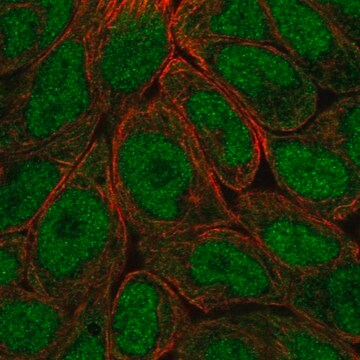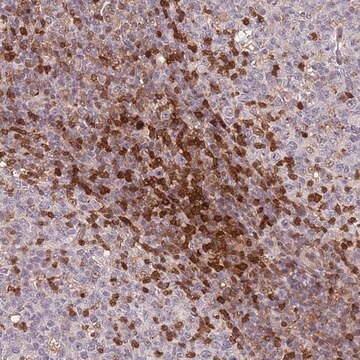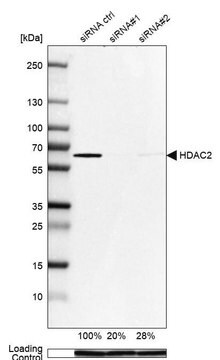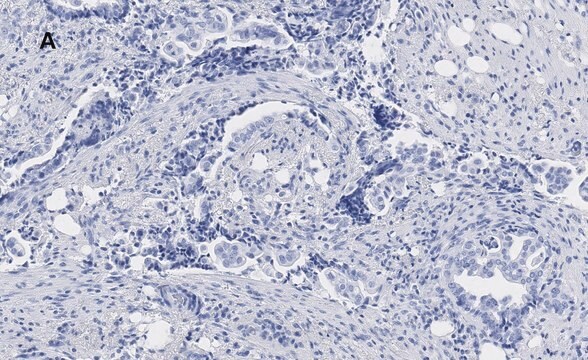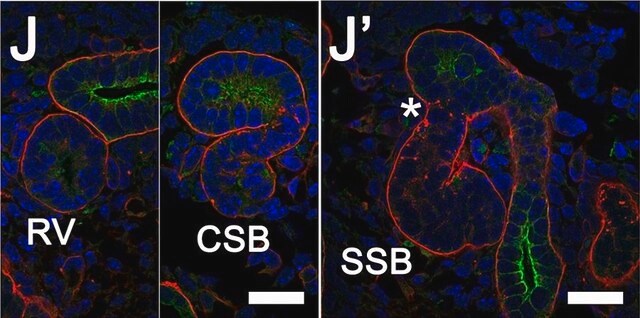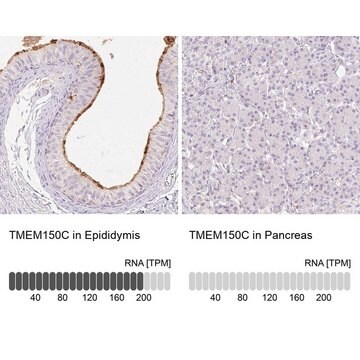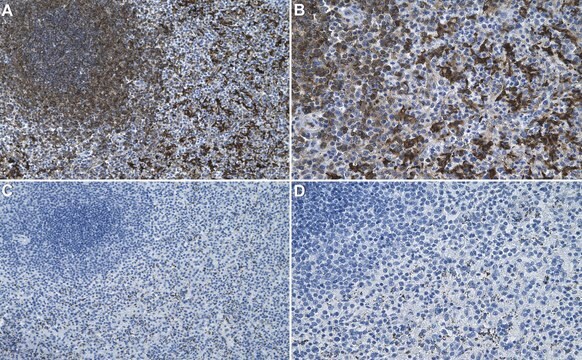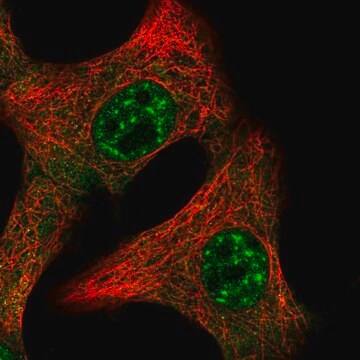推荐产品
生物源
rabbit
品質等級
共軛
unconjugated
抗體表格
affinity isolated antibody
抗體產品種類
primary antibodies
無性繁殖
polyclonal
產品線
Prestige Antibodies® Powered by Atlas Antibodies
形狀
buffered aqueous glycerol solution
物種活性
human
加強驗證
orthogonal RNAseq
Learn more about Antibody Enhanced Validation
技術
immunoblotting: 0.04-0.4 μg/mL
immunohistochemistry: 1:50-1:200
免疫原序列
MNHTVQTFFSPVNSGQPPNYEMLKEEHEVAVLGAPHNPAPPTSTVIHIRSETSVPDH
UniProt登錄號
運輸包裝
wet ice
儲存溫度
−20°C
目標翻譯後修改
unmodified
基因資訊
human ... IFITM3(10410)
一般說明
IFITM3 (interferon induced transmembrane protein 3) is a transmembrane-domain protein (5-18kDa) belongs to a family of murine genes. It acts as a cellular restriction factor. It is associated with various cellular processes such as cell adhesion, immune-cell regulation, germ cell homing and maturation, and bone mineralization. It is involved in the inhibition of infection by influenza virus and many other pathogenic viruses.
免疫原
Interferon-induced transmembrane protein 3 recombinant protein epitope signature tag (PrEST)
應用
All Prestige Antibodies Powered by Atlas Antibodies are developed and validated by the Human Protein Atlas (HPA) project and as a result, are supported by the most extensive characterization in the industry.
The Human Protein Atlas project can be subdivided into three efforts: Human Tissue Atlas, Cancer Atlas, and Human Cell Atlas. The antibodies that have been generated in support of the Tissue and Cancer Atlas projects have been tested by immunohistochemistry against hundreds of normal and disease tissues and through the recent efforts of the Human Cell Atlas project, many have been characterized by immunofluorescence to map the human proteome not only at the tissue level but now at the subcellular level. These images and the collection of this vast data set can be viewed on the Human Protein Atlas (HPA) site by clicking on the Image Gallery link. We also provide Prestige Antibodies® protocols and other useful information.
The Human Protein Atlas project can be subdivided into three efforts: Human Tissue Atlas, Cancer Atlas, and Human Cell Atlas. The antibodies that have been generated in support of the Tissue and Cancer Atlas projects have been tested by immunohistochemistry against hundreds of normal and disease tissues and through the recent efforts of the Human Cell Atlas project, many have been characterized by immunofluorescence to map the human proteome not only at the tissue level but now at the subcellular level. These images and the collection of this vast data set can be viewed on the Human Protein Atlas (HPA) site by clicking on the Image Gallery link. We also provide Prestige Antibodies® protocols and other useful information.
生化/生理作用
The activity of IFITM3 (interferon induced transmembrane protein 3) is post-translationally modulated by S-palmitoylation and lysine ubiquitination. IFITM3 shows controlled clustering in membrane compartments and antiviral activity against influenza virus in post S-palmitoylated condition. It has reported that S-palmitoylation positively regulates IFITM3 membrane affinity and antiviral activity. On the contrary, ubiquitination decreases localization with endolysosomes and decreases antiviral activity. It has also corroborated that gene silencing of IFITM3 plays an important role in glioma cell growth and migration. It can be used as a tumor biomarker as it possesses characteristics of inhibiting tumor development.
特點和優勢
Prestige Antibodies® are highly characterized and extensively validated antibodies with the added benefit of all available characterization data for each target being accessible via the Human Protein Atlas portal linked just below the product name at the top of this page. The uniqueness and low cross-reactivity of the Prestige Antibodies® to other proteins are due to a thorough selection of antigen regions, affinity purification, and stringent selection. Prestige antigen controls are available for every corresponding Prestige Antibody and can be found in the linkage section.
Every Prestige Antibody is tested in the following ways:
Every Prestige Antibody is tested in the following ways:
- IHC tissue array of 44 normal human tissues and 20 of the most common cancer type tissues.
- Protein array of 364 human recombinant protein fragments.
聯結
Corresponding Antigen APREST85237
外觀
Solution in phosphate-buffered saline, pH 7.2, containing 40% glycerol and 0.02% sodium azide
法律資訊
Prestige Antibodies is a registered trademark of Merck KGaA, Darmstadt, Germany
免責聲明
Unless otherwise stated in our catalog or other company documentation accompanying the product(s), our products are intended for research use only and are not to be used for any other purpose, which includes but is not limited to, unauthorized commercial uses, in vitro diagnostic uses, ex vivo or in vivo therapeutic uses or any type of consumption or application to humans or animals.
未找到合适的产品?
试试我们的产品选型工具.
儲存類別代碼
10 - Combustible liquids
水污染物質分類(WGK)
WGK 1
閃點(°F)
Not applicable
閃點(°C)
Not applicable
個人防護裝備
Eyeshields, Gloves, multi-purpose combination respirator cartridge (US)
Jacob S Yount et al.
Nature chemical biology, 6(8), 610-614 (2010-07-06)
Identification of immune effectors and the post-translational modifications that control their activity is essential for dissecting mechanisms of immunity. Here we demonstrate that the antiviral activity of interferon-induced transmembrane protein 3 (IFITM3) is post-translationally regulated by S-palmitoylation. Large-scale profiling of
Jacob S Yount et al.
The Journal of biological chemistry, 287(23), 19631-19641 (2012-04-19)
The interferon (IFN)-induced transmembrane protein 3 (IFITM3) is a cellular restriction factor that inhibits infection by influenza virus and many other pathogenic viruses. IFITM3 prevents endocytosed virus particles from accessing the host cytoplasm although little is known regarding its regulatory
Bing Zhao et al.
BMC neurology, 13, 210-210 (2013-12-29)
Interferon induced transmembrane protein 3 (IFITM3) is transcribed in most tissues and highly interferon-inducible. However, the role of IFITM3 in cancer is still poorly understood. Expression levels of IFITM3 were analyzed in 60 glioma patients by immunohistochemistry (IHC). Following closely
Wuxun Lu et al.
Virology, 464-465, 406-414 (2014-08-17)
To deepen our understanding of early rectal transmission of HIV-1, we studied virus-host interactions in the rectal mucosa using simian immunodeficiency virus (SIV)-Indian rhesus macaque model and mRNA deep sequencing. We found that rectal mucosa actively responded to SIV as
Song Wang et al.
Journal of virology, 88(15), 8375-8385 (2014-05-16)
Although alteration in host cellular translation machinery occurs in virus-infected cells, the role of such alteration and the precise pathogenic processes are not well understood. Influenza A virus (IAV) infection shuts off host cell gene expression at transcriptional and translational
我们的科学家团队拥有各种研究领域经验,包括生命科学、材料科学、化学合成、色谱、分析及许多其他领域.
联系技术服务部门
